EM AMW
Microwave for electron microscopy
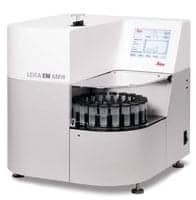
The new EM AMW, introduced by Leica Microsystems Inc, Bannockburn, Ill, features a microwave system for electron microscopy that automatically dehydrates specimens, infiltrates them, and polymerizes them in resin. The time for preparing specimens is a matter of hours instead of days. The automated, patented technology for tissue embedding allows results to be reproduced and documented. The combination of microwave chamber and automatic reagent changer minimizes the manual effort and time span from specimen dehydration to polymerization of the specimens. The unit automatically guides reagents into the microwave chamber equipped with the specimens and brings the specimens into contact with the correct fluid for a defined time and at a defined temperature. The monomode microwave chamber focuses the energy on a defined area, which results in a uniform microwave field and uniform action on specimen and reagent—without hot or cold points, and without the need for additional water loads. Users can select continuous or pulsed microwave power.
Leica Microsystems Inc
(800) 248-0123
www.leica-microsystems.com
EasyTox GC/MS Productivity Solution
Drugs of abuse testing
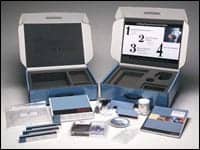
Thermo Fisher Scientific Inc, Waltham, Mass, consists of the Thermo Scientific DSQ II single quadrupole GC/MS system; ToxLab Forms 2.0 software; and GC/MS methods, consumables, and columns. The system offers flexibility and can be customized to meet the needs of labs, while the rapid GC/MS analysis ensures high throughput. The platform is designed for forensic, clinical, and medical labs performing analysis of urine for signs of drugs of abuse. The complete kit covers GC/MS confirmation methods that have been validated in urine matrix to ensure compliance. The system, including sample preparation and consumables, has been validated for linearity, precision, and specificity to cover GC/MS confirmation methods for five drug classes at cutoff concentrations specified by the US Substance Abuse and Mental Health Services Administration. The methods contained within the solution focus on maximizing speed of analysis. It provides method and data management, allowing toxicology labs to streamline data acquisition, review, and reporting. ToxLab Forms software offers tools for data review and reporting. Included in the kit are a quick-start guide, an interactive reference CD, and a CD containing a factory validation data set for the methods provided.
Thermo Fisher Scientific Inc
(800) 532-4752
www.thermo.com/fotox
MicroRNA Assay for Gene-Expression Profiling
High-density expression array
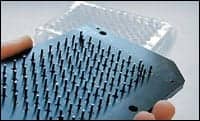
The new MicroRNA Assay for Gene Expression profiling from llumina Inc, San Diego, allows rapid and reproducible miRNA expression profiling. The tool’s high-density expression array, with content from the miRBase Sequence Database, helps researchers understand the role microRNAs (miRNA) play in regulating messenger RNA (mRNA). The miRNA expression multiplexed assays measure the levels of 735 or 380 miRNA in human or mouse samples, respectively, and are deployed on a 96-sample array matrix. The assay is an adaptation of the cDNA-mediated annealing, selection, extension, and ligation (DASL) assay. To quantify levels of a diverse population of miRNAs, the methodology and chemistry of the DASL assay are incorporated with a sample preparation for collecting total RNA from cultured cells or tissue.
Illumina Inc
(800) 809-4566
www.illumina.com
Rely Mono Rapid Test
Results in minutes
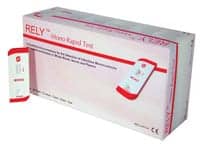
The Rely Mono Rapid Test from Stanbio Laboratory, Boerne, Tex, is a CLIA-waived rapid test for the qualitative detection of infectious mononucleosis in whole blood, serum, or plasma. It delivers results in 5 minutes. Available in a 20-test configuration, the kit includes individually pouched cassettes, sample buffer, disposable sample droppers, disposable heparinized capillary tubes with dispensing bulb, positive and negative controls, and a procedure card.
Stanbio Laboratory
(800) 531-5535
www.stanbio.com
gTox Flow Kit
For genotoxicity testing
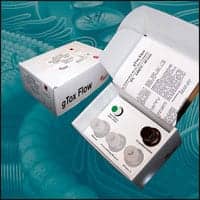
Beckman Coulter Inc, Fullerton, Calif, introduces the gTox Flow Kit—a new flow-cytometric approach to genotoxicity testing. The mouse micronuclei assay evaluates the ability of a compound to cause chromosomal damage. It detects micronuclei formed from chromatin that are displaced as result of chromosomal breakage. The nuclei are formed outside the main nucleus of the dividing cell. The assay enumerates micronucleated red cells in peripheral blood of treated mice, and is useful for preclinical drug candidate testing, environmental testing, and other academic and commercial toxicology applications. The kit was developed for the company’s FC 500 flow cytometer in single- or dual-laser excitation configurations, and incorporates a proprietary (patent pending) RBC permeation method that can be performed at room temperature without centrifugation preparation. The assay yields first results in less than 2 hours, and can be performed manually or automated on the company’s Biomek NXP laboratory automation workstation.
Beckman Coulter Inc
(800) 742-2345
www.beckmancoulter.com


